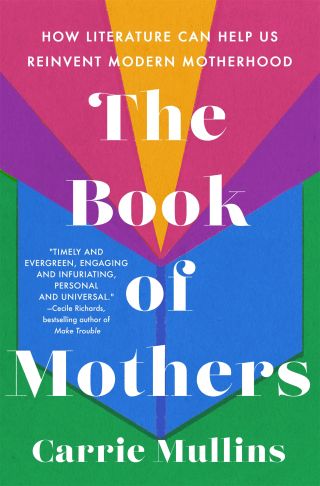
Carrie Mullins shares her thoughts on maternal mental health.
Source: Carrie Mullins/Used with permission
Carrie Mullins, author of The Book of Mothers: How Literature Can Help Us Reinvent Modern Motherhood, was tired of following an unexamined set of expectations for what motherhood looks like, so she wrote a book in hopes that it would offer insight into the social constructs around what it means to be a mother.
“We don’t talk enough about how our understanding of motherhood—i.e. why we think mothers should look, act, parent, and love in a certain way—is simply a set of cultural expectations that’s been built up over time, and rarely by women themselves,” she explained. “I hope the book encourages readers to treat mothers as equally important, interesting, and unique as any other character. When we flatten fictional mother figures to cliches, it becomes easier to treat real women the same way.”
Undoubtedly, society’s set of expectations for mothers impacts maternal mental health. However, limited peer-reviewed research has been done on mothers’ mental health outside of the perinatal period. One survey conducted through the community app Peanut revealed that 72% of women feel invisible in the mothering role. 93% reported feeling unappreciated, unacknowledged or unseen, and 93% said that, since having a child, they feel their identity is now limited to “mother” (Peanut, 2023).
With mothers bearing the brunt of the “invisible family load,” in addition to their professional responsibilities outside the home, it’s no wonder that moms often feel stressed and burnt out. From managing the home, to remembering to send grandma a birthday card, to holding space for her child’s big feelings about losing the game, mothers tend to be the one holding it all together at home, regardless of their outside commitments (Wayne, J.H., Mills, M.J., Wang, YR. et al., 2023). Data collected by CVS Health in 2022 found that 42% of working mothers surveyed were diagnosed with anxiety and/or depression, compared to 25% of their coworkers without kids. Working moms were also more likely to report that their mental health had worsened in the last year.
The societal pressures don’t end there. Legislation impacting mothers can lead to significant mental health implications, particularly for historically marginalized populations who are already at risk (Ogbu-Nwobodo, L., et al, 2022). I spoke to Mullins, who urged, “We need to legislate for mothers, and we need to do it now! It’s unacceptable that only financially well-off mothers in this country are assured quality health and childcare. If, as so many politicians claim, the family is the heart of America, then we need to put the policies in place that prove it. Our bottom line cannot be simply that these families exist, or have been forced to exist, but that they have a chance to thrive.”
Mullins explores these themes and more in her refreshing take on motherhood through the lens of literature. Here are her thoughts on motherhood and mental health:
Q: What mental health themes emerged as you were doing research for your book? What mental health issues plague modern mothers most, from your perspective, and in what ways does this differ (or reflect) the picture of motherhood found in classic literature?
A: I think many mothers today suffer from both feelings of overwhelm and, not unrelatedly, anxiety. Anxiety is nothing new; Mrs. Bennet in Pride and Prejudice is understandably worried about securing husbands who can provide for her daughters. What’s changed is how we think about a mother’s role. Mrs. Bennet basically had one job, whereas today’s mothers are told they are in charge of their children’s health, safety and emotional, social, and financial well-being. If their child “fails” in any of these metrics, it’s somehow a reflection of their ability as a parent.
Q: In Chapter 3 you examine Little Women by Louisa May Alcott and explore Marmee’s anger, reflecting on how modern moms are often expected to be endlessly gentle and joyful. Do you feel moms today are expected to repress their emotions? What effect do you suppose this has on maternal mental health? What does this teach the next generation about emotions?
A: Unfortunately, I think it’s all women and not just mothers who are expected to repress their emotions. As a society, we’re uncomfortable with female anger. But the situation has reached a crisis point with many mothers of my generation because of the rise of gentle parenting, which is essentially the idea that you should remain emotionally neutral with your kids at all times—even if your one child purposefully rips up your other child’s art project and then throws paint at the wall. The idea that the best way to parent is to never show anger not only places an impossible burden on parents, it leaves me wondering what happens to our kids when they inevitably feel or see anger themselves. How will they be able to process and normalize it? And how, if we’re always hiding ourselves, will our children get to know us as people? I think the key to a lasting relationship between kids and their parents is everyone knowing—and loving—each other as individuals.

“The Book of Mothers” explores motherhood through the lens of literature.
Source: Carrie Mullins/Used with permission
Q: What systemic issues negatively impacting mothers today stand out to you most? What connection do you see between the ways society has shifted over time in relation to motherhood, and maternal mental health?
A: What surprised me most in researching this book was actually the ways in which society has not shifted in relation to motherhood. In America, the twin ideas that a) the individual family unit is responsible for itself and b) the best person to raise a child is its mother, are deeply engrained in our culture and continue to guide our policies. This is the case even though we’ve fallen short of our peer countries in almost all metrics for maternal well-being. We need universal paid parental leave, better maternal health services, and subsidized childcare. All these initiatives have been shown to increase positive outcomes for children, and they would certainly benefit maternal mental health.
